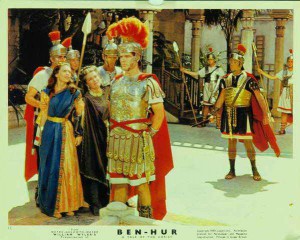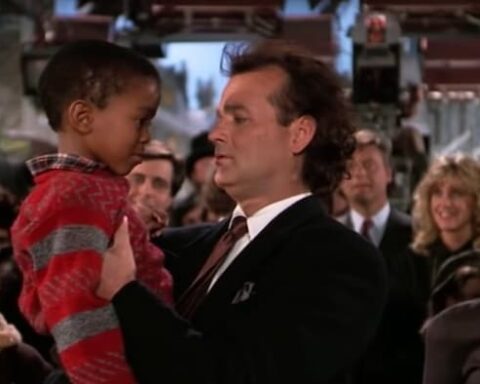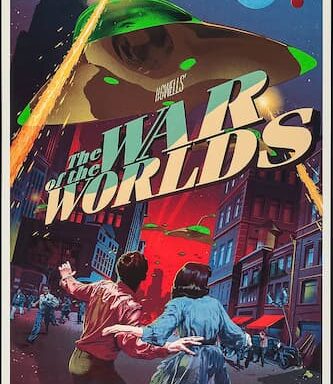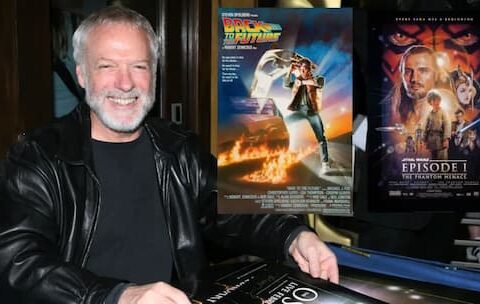Why on earth has Ben Hur been re-made?
If we’re talking about completely unnecessary remakes, you could barely get any more unnecessary than trying to remake a movie that is already an absolute classic.
Trying to appeal to a new generation? Why remake the movie? Why not just re-release the original?
Directed by Timur Bekmambetov and written by Keith Clarke and John Ridley, this is now the fifth film adaptation of the 1880 novel Ben-Hur: A Tale of the Christ by Lew Wallace. It follows the 1907 silent movie, the 1925 silent film, the universally loved Academy Award-winning 1959 film (theatrical poster pictured above) and a 2003 animated film.
The trailer looks truly awful; like the worst, most macho and uninspired version of Roman times of the type we’re familiar with from such dross as Spartacus: Blood and Sand or 300 (the latter not Roman per se, but the same greased up, chest-thumping sausage fest).
You can almost guarantee a dire, flat movie, with lots of violence, macho posturing and ‘edgy’ profanities, but with none of the charisma or flare of the 1959 William Wyler classic.
While remakes are a lazy, spiritless industry at the best of times, remaking a classic is just stupid (and an extraordinary waste of money).
Remaking an old film that maybe wasn’t such an original success story would make more sense; but remaking Ben Hur is like trying to remake Lawrence of Arabia. Utterly pointless.
And part of the problem from the outset is that you can’t make a movie by 2016 sensibilities to match an epic that thrived on 1959 sensibilities.
In 1959, MGM threw everything behind the movie and it was met with tremendous excitement. It was a big deal even before it came out, and a bigger deal afterward. Ben Hur 2106 isn’t.
And there’s no way in 2016 they’re going to commit to anything like the 3 hours and 44 minutes the 1959 version took to properly tell the story.
Are they, in 2016, going to find someone to deliver a score to match what Miklós Rózsa did? Of course not. Are they going to be able to match the 1959 level of set and prop design? Are they going to match Elizabeth Haffenden for the 1959 levels of costume design? Can they get anywhere near the 1959 quality of art decoration?
Of course not. Because Ben Hur 2016 is a fart in the night by comparison and will be forgotten within weeks. A 100 million dollar fart, at that.
Moreover, aside from the central Charlton Heston performance, you’re not going to find someone to bring as much quality and charisma to the key role of Messala as Stephen Boyd (pictured below) did in 1959. Not going to happen.

So why try to redo something that has already been immaculately and definitively done?
Why not take the same budget and just make a whole new movie set in the same era? Why not just write an original story?
Gladiator (1999) was a huge success, after all. Alright, come to think of it, Gladiator was to some extent a retelling of Anthony Mann’s 1964 movie Fall of the Roman Empire (another great movie, and also starring Stephen Boyd): but it was only partly a retelling of that story and broadly followed a different narrative.
But this new Ben Hur, on the other hand, is essentially looking to tell the same story as the William Wyler classic: only, I guess, ‘updated’ for a ‘new generation’.
Again, what annoys me too is that you could take the same 100 million dollar budget and make a whole new film set in the same time or exploring real historical figures instead.
Ideas? Why not make an epic movie about Augustus? Or Cicero? Or explore the story of Marcus Brutus from a new angle. Or stay in Judea and do Pontius Pilate. Or Mary Magdalene. Or Herod. That’s just off the top of my head – there are literally a few dozen possibilities.
So what you’re left with is a futile exercise in corporate cinema in an era of increasingly diminished creativity and ideas.
I absolutely guarantee this movie will suck. If you’re interested in this story, don’t bother going to see this release: just go seek out the 1959 version.

The classic Ben Hur was released about 20 years before I was even born; but I was captivated by it the first time I saw it, aged about fifteen, during a mid-afternoon TV broadcast. The fact that it was an old, aged film depicting a bygone, mythic time may have a lot to do with why Ben Hur is so enchanting in a way that a 2016 remake can’t be.
Watching an aged, vintage film using quaint, old-style set designs and matte paintings, itself imparts a historic aura to the drama, therefore amplifying the sense that you are watching a story about a long-gone time.
As a kid, I was engrossed by the movie right from the start: with that evocative, magical opening sequence of the classic Nativity scene (note: an aversion to overly religious sequences might make it difficult for you to stomach some of this film), filmed, staged and colored in such a way that it feels like a real life version of a Christmas card. Miklos Rozsa’s epic, choral score for this opening sequence is everything.
But really, despite its overtly Gospel undercurrents, Ben Hur isn’t overly evangelical: the Christ story provides a bookend for the beginning and end of the narrative, but is only strategically referenced in most of the movie.
This wasn’t ultimately a story about redemption or love, but a revenge story. The most interesting and enduring thing here was never in a million years the love story between Judah Ben Hur and Esther, but the platonic love story between Ben Hur and Messala: and the story of their broken friendship and subsequent enmity.
I could take or leave one or two of the performances (Haya Harareet’s Esther doesn’t hold up very well at all), but Stephen Boyd’s Messala (based on the known historic figure of Marcus Valerius Messalla Corvinus) is epic and, in particular, Messala’s deathbed scene is one of my two or three absolute favorite scenes in all cinema (“It goes on, Judah… the race is not over…”).
It also, of course, has the sequence it is most famous for: the epic chariot race – which even now (never mind 1959) stands as one of the great technical feats of cinema. The inspiration for the podrace sequence in The Phantom Menace and numerous other sequences in cinema, it is pretty much impossible (and pointless) for any contemporary production to try to reproduce that sequence or try to recapture the magic.
In short, the 1959 William Wyler version of Ben Hur stands as an unassailable masterwork of cinematic vision and execution.
It is not perfect: and though this film would be on my all-time top ten list, there are enough minor problems I have with it that I wouldn’t be able to put it on a higher pedestal than Lawrence of Arabia (which literally is perfect) as far as the great epics go.
But what is clear is that this 2016 remake has no chance: and is surely a completely pointless, 100 million dollar exercise in futility.
See the trailer for the new Ben Hur here.





great post, thanks for the read
I made the mistake of watching the new “Ben Hur”. Yes, it was pretty bad. Though in your friend’s defense, some “classics” (this is really an arbitrary designation) will hold up, most will not. For me, Willy Wonka’s chocolate factory holds up (one of the favorites of all time), and Charlie and the Chocolate Factory should have never been made. Young Frankenstein and Some Like It Hot are amazing, in my humble opinion, but the “acting” in old movies (including Citizen Kane, Gone with the Wind) I couldn’t stand because they talked like they were on stage. I mean of course they were on a sound stage, but I don’t want to hear that in their delivery. I never liked the old timey style of acting, but at the same time, I hate CGI too. I actually prefer the animation cells of old, it’s so much more beautiful. I think I’m doomed to be unhappy with the art overall no matter what the era.
I will say this: I have noticed that reading what you write about the classics is more enjoyable to me than actually watching the classics you are talking about. I don’t know how to explain it. It’s like the Mad Men phenomenon. I thoroughly enjoyed reading reviews and writeups about it, but I couldn’t watch it because I felt it was too slow. The stuff I read about Citizen Kane was more riveting to me than watching the actual movie. I get that this makes me a cultural Philistine, but I can’t make my heart feel something it won’t (stole that from Bonnie Rait). It’s like I get excited by what other people say, and then I see what they’re talking and writing about, and I think, “was it all in their heads?” I love reading and watching Westworld (the HBO series and the 1973 original), but the feelings don’t translate for other shows and movies.
I’m not saying your enjoyment of the classics isn’t real…after all, enjoyment is always just in our heads. But I guess everyone of us adds a little something to what we see that can only be experienced by us.
I think it’s possible that having too much material, essays, mythology, etc, around a film before someone’s even seen it can hurt the experience and make it difficult to watch the film purely on its own merit. I think that’s the case with Citizen Kane.
I somewhat agree that the acting style in a lot of the older movies is more theatrical – it tends to be either great or annoying, depending on the actor, the movie and the script. Some actors specifically are more suited to that style of film and acting.
I agree with you about the old style animation – some of those old Disney films are masterpieces; and the modern CGI doesn’t seem to be able to evoke the same magic.
Beautiful write up and tribute to the original Ben Hur; a true classic and one of few movies that got me a bit emotional as the plot unravlesd. In my book it is definitely among the religious classic masterpieces the likes of the 10 Commandments, Brother Sun Sister Moon, Martin Luther, (for those who can’t get past the J word) J of Nazareth, etc…
The thought of making a movie about Pontious Pilate or Mary Magdalene is very Interesting since some of these fascinating personalities in the Gospels aren’t much more than a blip on the radar but provide rich insight to the historical narratives.
But it also begs the question of whether contemporary artistic license can be trusted to fill in the blanks when taking what may amount to one paragraph in the sage’s pages and transformed it into a 2 hour screenplay. Perhaps one way around that is with a $100M production that provides a collective cast of the many unsung gospel characters living in AD Judea and being carried to a point of decision for or against the Messiah. Only question is who could be trusted to keep the story line true to the ancient text other than the controversial Gibson.
As for those who can’t stomach old movies… society just needs to bring the retro cinema in vogue and associate the manliness or feminity of laddie and lassie with their ability to watch old movies… it may even help them surmount the typical 3×5 card attention span that plagues most of our contemporaries.
I haven’t watched most of those movies you mentioned: but I do have the Jesus of Nazareth series on complete VHS. The casting for that series was extraordinary: everyone from James Mason and Peter Ustinov to Anthony Quinn. And Robert Powell is the best Jesus I think there’s ever been on the screen.
Yes Robert Powel has a purity to his persona and is unrivaled in his performance of Christ; he sets a lofty holy benchmark that I have yet to see any other actor portraying Christ come remotely close to.
Interestingly Franco Zefarelli’s choice in a hansome Powell is at variance with Isaiah’s profecy that there would be no comliness in the messiah that we should desire him (for his good looks)… and in another place says that Messiahs skin would be Olive (as we see across the eastern latitudes where the descendents of Shem (Shemetics… Semetics) mostly inhabit.
Though non sequiter in this discussion Isaiah also describes the coming Messiah as a man of sorrows and associated with grief and that has always made me wonder if his non biological father Joseph treated him like a red headed stepchild and if in retribution the scriptures are mum as to Joseph’s life and fate.
Back to J of N… An interesting tidbit is that years back I had learned from a source close to Zefarelli during the lath 70’s production of J of N, that Zefarelli himself had an affinity for hansome men… though in my eyes it has never detracted from his trilogy film which is an impeccable magnum opus relating the life of Jesus Christ.
Back to Robert Powell, rumor has it that most actors who play Jesus usually have a short lived career and seldom get another role in another film.
It’s been a while since I’ve watched Laurence of Arabia… it’s the other great trilogy. It’s historic value is facinating as it brings the viewer back to an era and events that have been all but forgotten but those same events shaped the power in the Middle East and would affect world power circles and history for 100 years to come. I am particularly facinated by the movie’s allusion to General Allenby’s conquest of Jerusalem. It is rumored that the city was surrendered by the Ottoman Turks when the General announced himself as coming to take the city because Allenby phonetically translated to “The Prophet” in Arabic which fulfilled an ancient profecy that a profet would come to take the Holy City.
Peter O’toole is a ninja in L of A… and as for historical Laurence himself, I’ve always wondered about his pathetic “accidental death” since it reeks of the typical fate that other great conquerors after him (the likes of George Patton) have suffered… saints get sanctified. Laurence was a fellow motorcycle man and that’s the place he still holds in my heart.
Well, Max Von Sydow famously played Jesus in ‘The Greatest Story Ever Told’ – which I still think is an amazing film in terms of cinematography. So he didn’t do too badly. And I know another Jesus portrayer ended up being the first Captain in the original Star Trek. But yeah, you’re right – they generally don’t do too well.
Your story about Allenby is fascinating – I never knew that; even though I’ve read several biographies of Lawrence and his campaign.
Peter O’Toole is my favorite film actor, in fact. And regarding the real T.E’s motorcycle accident – yes, there are a lot of question marks over it, including alleged eyewitnesses who supposedly saw him being followed by a strange car. It is interesting too that Prince/King Faisal (portrayed by Alec Guinness in the movie), who was Lawrence’s primary ally/subject, also died fairly young – and there have been question marks over his death too.
Always good to talk to you, anyhow! You bring such rich ingredients to the table.
I was horrified by the trailer. There are so many dumb clichés littered throughout.
Yeah and that’s just in the trailer. Imagine the script.
I blame new technology for the remakes and constant sequals. I suspect that the cgi and special effects people get carried away with new developments so are chomping at the bit to use them on the next movie. However, there just isn’t enough new stuff written to satisfy them and whenever they see an old classic they think “we can do way better than that with what we have now, that is so badly done compared to what we can do these days”.
Your turn of phrase is priceless by the way – fart in the night – million dollar fart – thanks for making me laugh.
You’re welcome to use that phrase in casual conversation, if you like.
I find it ridiculous that they’re throwing that kind of money around but can’t find some people to come up with original ideas. Particularly when you read about talented writers and ideas that never get given the go-ahead by big studios because they ‘don’t want to take a risk’.
Apparently Hollywood has run out of ideas for original cinema….I mean do we need 3 Hulks or 7 Superman or 3 different Spideys…a lack of imagination….chuq